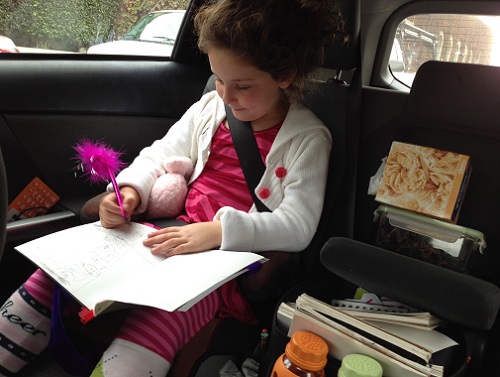The Second Developmental Stage: “Applying the Method”
 The above image is by Keetgi and is an entry in our WBWW Kindle Fire Giveaway!
The above image is by Keetgi and is an entry in our WBWW Kindle Fire Giveaway!
The first stage of development for homeschooling parents is the “I can’t wait to start” stage. Homeschooling gives a stay-at-home parent’s life meaning, a direction for the days, and activities to fill the long hours with small children.
Sometimes in our eagerness to move beyond Sesame Street, play-doh, and naps, we hurry to add “school” (structured study of phonics, math facts, and handwriting). We are keen to feel stimulated; homeschool bridges the need to entertain children and stimulate ourselves at the same time. As I shared before, though, slow down. Face paint and dress up clothes are still the best curricula for the 5 and under set. Don’t rush it, and accidentally inoculate your children against the joy of learning.
But what if you’ve got a 5-6-7 year old? Shouldn’t you be doing something by now? Most homeschoolers begin in earnest with a child somewhere in this age range. They either start with never-have-been-to-school kids or they pull their unhappy children from the local school.
These parents are wholehearted. They read everything they can about homeschool, they dialog with friends who are a couple years ahead of them, they join online discussion groups, and local co-ops and support groups.
Once they figure out what it is they intend to teach (in whatever method—Sonlight to unschooling, classical education to Charlotte Mason, Konos to Calvert, My Father’s World to Montesorri, religious to secular, Thomas Jefferson to eclectic, K-12 to Clonlara), they apply the method.
“Applying the Method” – It’s done with energy, conscientiousness, attention to the “rules” (even unschooling has “rules” as in – “You are not an unschooler if you…”), and a methodological approach. There are schedules or a scrupulous fear of creating them. There are new books, pencils, creative arts resources, library cards, Legos, and bulletin boards. Your enthusiasm is contagious and your children (most often) respond well to “the method” at the outset. This positive “call-response” energy validates your decision to follow this particular style of schooling. You feel secure. You feel excited to dive in and live the homeschooling life!
When “applying the method,” there’s a firm belief that if you follow through correctly, the results will be good (children will learn to read, they will master math facts, they will be interested in history, they will be curious about science, they will appreciate nature and art, they will show initiative, creativity, and diligence, they will go to college).
On the days when your plans are met with resistance, you double down on the method—looking for the one gap in your strategy. “Which piece didn’t I apply? What part did I not master? How am I failing to create the home conditions this method requires for the results promised?”
In these moments, the homeschooling parent seeks support from successful (or at minimum, committed) users of the method. “Did you have this problem? How did you solve it from within the method?”
A renewed commitment ensues. The parent takes firmer hold of the method and carries on.
The “Applying the Method” period of success can last anywhere from a week to several years, depending on the method and the children (combined with your personality). If you choose a method that is out of sync with who you are (or who your kids are), it will unravel quickly. If you pick one that for the most part fits your personality (or is well suited to most of your children), you are likely to have some success for a good little while!
“Applying the Method” has a shadow, though. In our newness to homeschooling and our relative insecurity that we can duplicate the standardized educations of the school system (even if we truly loathe the school system, we still find ourselves unwittingly measured against it at some point in time), we may err on the side of “system” over “intuition,” “observation,” and “course correction.”
In other words, we trust the method too much. We place our faith in the method rather than in our relationship to our children. Trusting the method too much may mean we forget three key components for a thriving homeschool:
1) Our children. They have a real say. They have real needs and feelings that differ from one another, and possibly from you. Their experience of homeschool is critical to its success.
2) Our context. Our spouses, friends, relatives, and local environment exert pressure. We are not immune to it. Spouses get a bigger vote than extended family, but sometimes where we live (too remote, too urban) also adds an element of challenge that must be taken into consideration when homeschooling.
3) Ourselves. We matter! Our personalities, attention spans, curiosities, interests, and our particular tastes and distastes—some methods are just not suited to the kind of person you are or I am. It’s important for there to be a good fit for us, too.
Once you come to the end of “the method” (every homeschooler does!), it’s time for the next season/stage of development. We’ll look at that next: The “Switch it Up” phase.
Image (cc)
Cross-posted on facebook.


















[…] you’ve started homeschooling in earnest and have “applied the method” faithfully, a bump in the road will inevitably occur. Even if your kids are cooperating […]